Abandonment
to Divine
Providence
The Classic Text
with a Spiritual
Commentary by
Dennis Billy, C.Ss.R.
The greatness of Abandonment to Divine Providence and the reason it should be ranked among the classics of Christian devotion is its abilitysimply and profoundly-to lead us to God. Caussade has read our soul and spoken to our condition. But even more, he has taken us by the hand and led us to the twin paths of trust and obedience that converge onto the highway of godliness.
Richard J. Foster Author of A Celebration of Discipline
Since its publication in 1861, Abandonment to Divine Providence by JeanPierre de Caussade, Sj., has proven to be not only a spiritual classic, but also one of the finest expressions of French and Jesuit mystical theology. Fr. Dennis Billy, C.Ss.R., illuminates the depth and meaning of Abandonment with a commentary that is scholarly, insightful, and full of sound spiritual wisdom.
Robert L. Fastiggi Professor of Systematic Theology Sacred Heart Major Seminary
This book is a marvelous gift. In a time that is practically defined by distractions, we can all find our way to God by reading both Fr. Billy's luminous commentary and the classic text itself. While reading this book, citizens of the frenetic Western world will desire, and perhaps even know, the healing found in receiving God as he comes to us at every moment of our day.
James Keating Director of Theological Formation Institute for Priestly Formation Creighton University
Abandonment
to Divine
Providence
The Classic Text
with a Spiritual
Commentary by
Dennis Billy, C.Ss.R.
Jean-Pierre de Caussade









In memory of my father Michael Billy, Sr., (1924-2009) in gratitude and appreciation for his deep love and fatherly care
0 bread of angels, heavenly manna, the pearl of the Gospel, the sacrament of the present moment!
Abandonment to Divine Providence
Contents
....................................................................................... 1
...................................... 9
......................................................... 17
........................................................................................ 19
........................................................................................ 85
............................................................................................. 199
........................................................................ 203
.......................................................................... 205
Introduction
 he popular spiritual treatise commonly known as Abandonment to Divine Providence is widely renowned as one of the great classics of Western spirituality.' Written late in the first half of the eighteenth century, it first circulated only in manuscript form and did not find its way into print until well over a century later. Although recent scholarship has raised serious concerns about its authorship, it has generally been attributed to the French Jesuit spiritual writer Jean-Pierre de Caussade (1675-1751). One of Caussade's assignments during his varied career as a priest and religious was his appointment in 1733 to theJesuit retreat house in Nancy. It has been argued (and, until recently, nearly universally accepted) that the work was compiled from letters of spiritual direction he had written from there to the superior of the Visitation convent in that city.2
he popular spiritual treatise commonly known as Abandonment to Divine Providence is widely renowned as one of the great classics of Western spirituality.' Written late in the first half of the eighteenth century, it first circulated only in manuscript form and did not find its way into print until well over a century later. Although recent scholarship has raised serious concerns about its authorship, it has generally been attributed to the French Jesuit spiritual writer Jean-Pierre de Caussade (1675-1751). One of Caussade's assignments during his varied career as a priest and religious was his appointment in 1733 to theJesuit retreat house in Nancy. It has been argued (and, until recently, nearly universally accepted) that the work was compiled from letters of spiritual direction he had written from there to the superior of the Visitation convent in that city.2
Despite its profound insights into the life ofabandonment3 and the sacrament of the present moment, the treatise did not make its way beyond a small circle of nuns. In time, it was filed away in a convent archive, where it collected dust and eventually fell into obscurity. It received wide acclaim only years later, when it was rediscovered and then edited and published by Henri Ramiere, S.J., in 1861. From the beginning, this standard version of the treatise has been widely heralded as a classic of Catholic spirituality. Even today, it still has much to offer the interested reader.'
Plan and Purpose of this Edition

As presented by Ramiere, the treatise consists of fifty-four brief meditations on the meaning of complete self-abandonment to God's will. These reflections are unevenly distributed over two books, comprising a total of six chapters, and touch on various themes related to the sacrament of the present moment. The work has a simple structure, designed to lead us into a deeper appreciation of how God is present to us at every moment of our lives. It does so by combining striking imagery with a reflective yet engaging literary style that often flows into spontaneous outpourings of heartfelt prayer. Its main insight is that God reveals his will for us in the present moment through the duties of our state in life. We conform ourselves to God's will by fulfilling these obligations as they surface from one moment to the next. As we do so, we become more in tune with the promptings of the Holy Spirit and are eventually able to intuit God's will in the changing circumstances of our lives.
The treatise cautions us against allowing anything to get in the way of fulfilling our present duties in life and following the lead of the Holy Spirit. If we are not careful, even such good and legitimate activities as reading, study, and pious devotions can divert us from our primary purpose of following God's will in the present moment. When we abandon ourselves entirely to God, we soon discover that Divine Providence is at work in our lives, actively pursuing our well-being by leading us to those intellectual and spiritual pursuits most conducive to making us holy. Complete selfabandonment involves letting go of all of our attachments and trusting that God is watching over, protecting, and leading us at each moment in our journey through life.

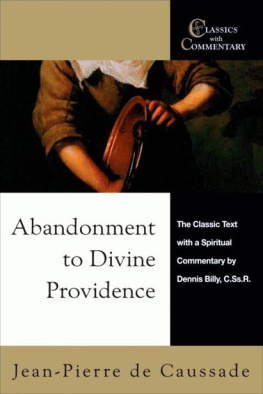

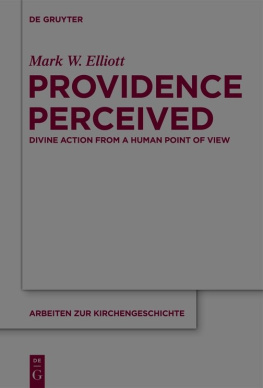

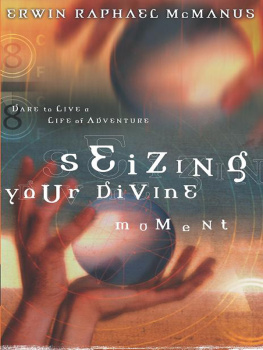
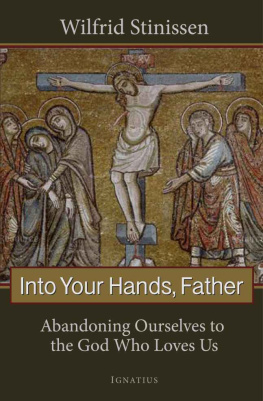
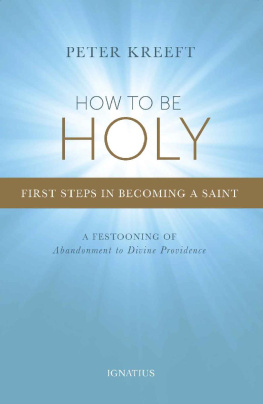
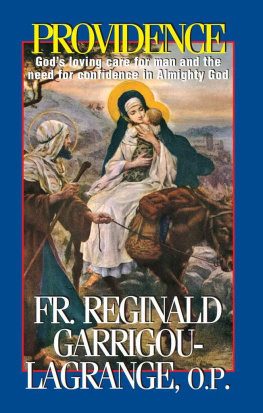
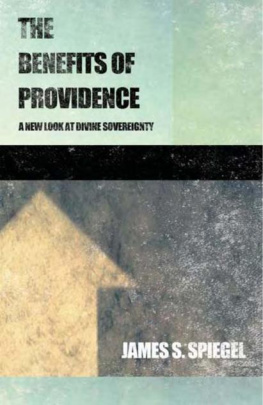
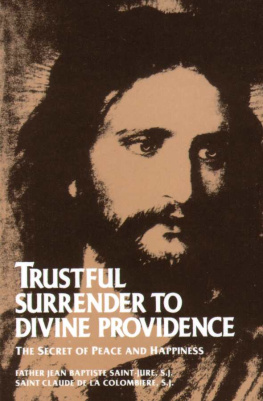















 he popular spiritual treatise commonly known as Abandonment to Divine Providence is widely renowned as one of the great classics of Western spirituality.' Written late in the first half of the eighteenth century, it first circulated only in manuscript form and did not find its way into print until well over a century later. Although recent scholarship has raised serious concerns about its authorship, it has generally been attributed to the French Jesuit spiritual writer Jean-Pierre de Caussade (1675-1751). One of Caussade's assignments during his varied career as a priest and religious was his appointment in 1733 to theJesuit retreat house in Nancy. It has been argued (and, until recently, nearly universally accepted) that the work was compiled from letters of spiritual direction he had written from there to the superior of the Visitation convent in that city.2
he popular spiritual treatise commonly known as Abandonment to Divine Providence is widely renowned as one of the great classics of Western spirituality.' Written late in the first half of the eighteenth century, it first circulated only in manuscript form and did not find its way into print until well over a century later. Although recent scholarship has raised serious concerns about its authorship, it has generally been attributed to the French Jesuit spiritual writer Jean-Pierre de Caussade (1675-1751). One of Caussade's assignments during his varied career as a priest and religious was his appointment in 1733 to theJesuit retreat house in Nancy. It has been argued (and, until recently, nearly universally accepted) that the work was compiled from letters of spiritual direction he had written from there to the superior of the Visitation convent in that city.2